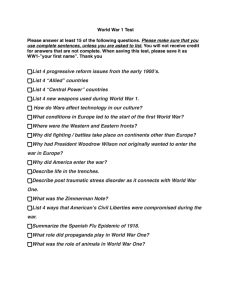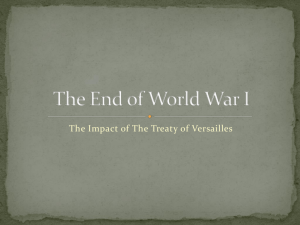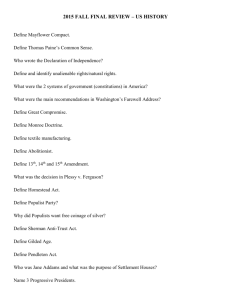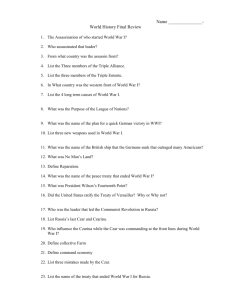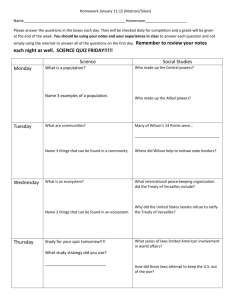World War I Study Guide
advertisement
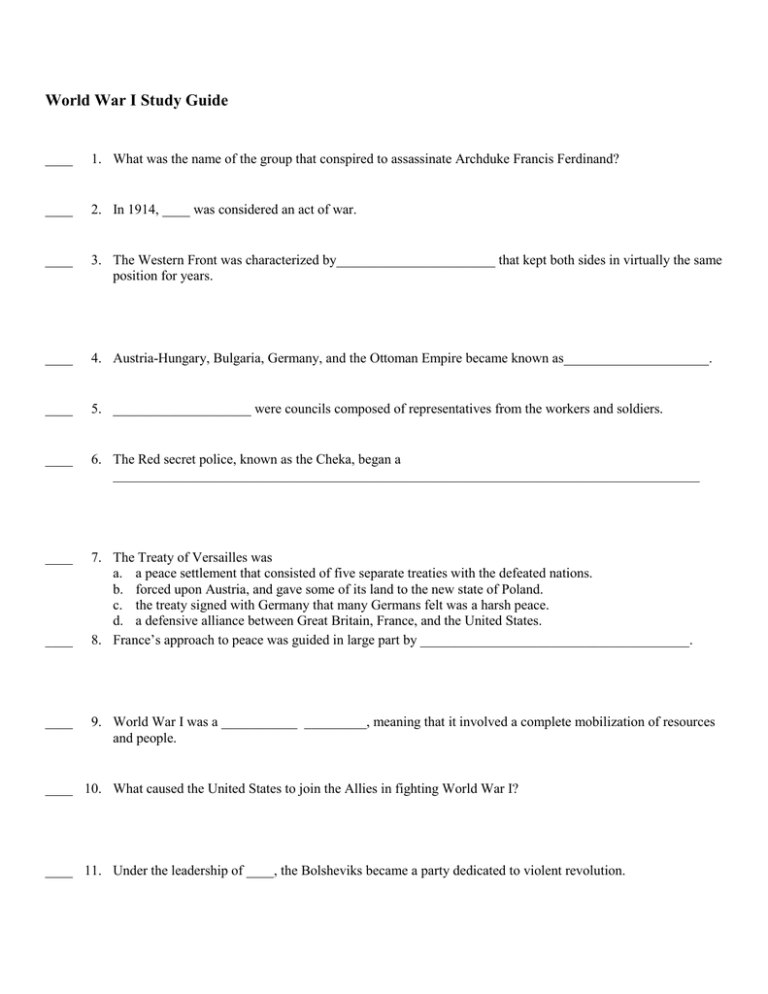
World War I Study Guide ____ 1. What was the name of the group that conspired to assassinate Archduke Francis Ferdinand? ____ 2. In 1914, ____ was considered an act of war. ____ 3. The Western Front was characterized by_______________________ that kept both sides in virtually the same position for years. ____ 4. Austria-Hungary, Bulgaria, Germany, and the Ottoman Empire became known as_____________________. ____ 5. ____________________ were councils composed of representatives from the workers and soldiers. ____ 6. The Red secret police, known as the Cheka, began a _____________________________________________________________________________________ ____ 7. The Treaty of Versailles was a. a peace settlement that consisted of five separate treaties with the defeated nations. b. forced upon Austria, and gave some of its land to the new state of Poland. c. the treaty signed with Germany that many Germans felt was a harsh peace. d. a defensive alliance between Great Britain, France, and the United States. 8. France’s approach to peace was guided in large part by _______________________________________. ____ ____ 9. World War I was a ___________ _________, meaning that it involved a complete mobilization of resources and people. ____ 10. What caused the United States to join the Allies in fighting World War I? ____ 11. Under the leadership of ____, the Bolsheviks became a party dedicated to violent revolution. ____ 12. In an attempt to end Russia’s involvement in the war, Lenin signed ____________________________ ____ 13. Who became the spokesperson for a new world order based on democracy and international cooperation? ____ 14. Germany was especially unhappy with Article 231 of the Treaty of Versailles because it ____ 15. The Triple Alliance was a loose agreement of cooperation among ____ 16. Which of the following is NOT considered a major cause of World War I? a. the growth of nationalism c. militarism b. impressionism d. internal dissent ____ 17. Austria-Hungary feared that Serbia would________________________________________________. ____ 18. To maintain high morale and maintain support for the war among their citizens democratic states used ____ 19. Air warfare in World War I involved all of the following EXCEPT a. the first long-range missiles. c. attacking ground targets. b. spotting enemy positions. d. shooting down enemy aircraft. ____ 20. Across Europe, wartime governments a. maintained free-market conditions. c. reduced their powers. b. set up planned economies. d. deregulated prices, wages, and rent. ____ 21. Russia was unprepared for war in all of the following ways EXCEPT one. Which one? a. no competent military leaders c. poorly armed military b. weak armament industry d. no czar ____ 22. Women workers in Petrograd marched in protest, then a. organized a general strike. c. consulted with Rasputin. b. learned to bake bread. d. joined the czar’s army. ____ 23. Outwardly, Lenin turned over power to the all-Russian Congress of Soviets, then a. invaded Poland with a mercenary army of peasants. b. signed a peace treaty with the czar and became deputy czar. c. passed real power to a Council of People’s Commissars that he controlled. d. retired from politics and settled in the Ukraine. ____ 24. Military opposition or other forms of challenges to the Red Army came from all of the following EXCEPT a. Siberian anti-Communists. b. Italian royalists who supported Lenin. c. Allied material aid to the anti-Communists. d. the Ukrainians. ____ 25. American president Wilson argued at the Paris Peace conference most strongly for ____ 26. To gain Arab support against the Ottoman Turks during the war, the Allies had promised to ____ 27. Under the terms of the Treaty of Versailles, Germany was forced to do all of the following EXCEPT a. return Alsace and Lorraine to France. b. give up land to a new Polish state. c. pay for war damage. d. run Italy as a mandate. ____ 28. The Treaty of Versailles was signed by the Big Three powers as a peace settlement with ____ 29. After German emperor William II fled the country in 1918, Germany formed a ___________________________________________________________________________ ____ 30. _________________, the aggressive preparation for war, was growing along with nations’ armies. ____ 31. The German advance toward Paris was halted at what battle? ____ 32. After the war, Britain ruled Iraq and Palestine as a. colonies, which they received as part of Germany’s war reparations. b. mandates on behalf of the League of Nations, but did not own the territory. c. indirect rulers, which allowed the two nations some semblance of autonomy. d. direct rulers, leading to much animosity that still exists today. Constructed Response Question:

